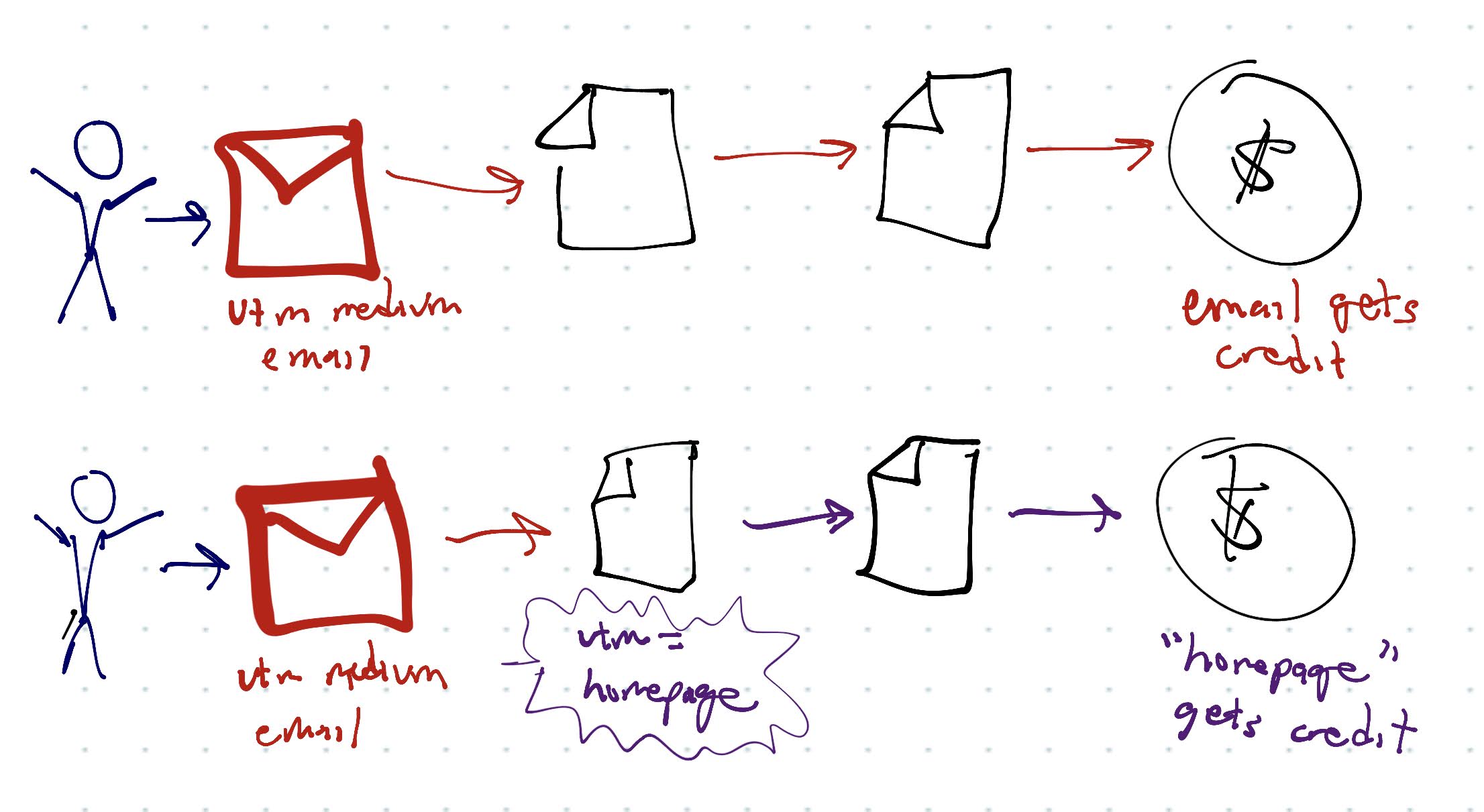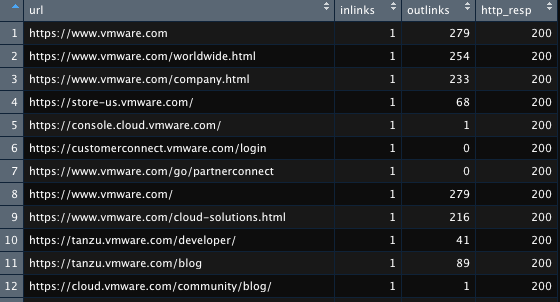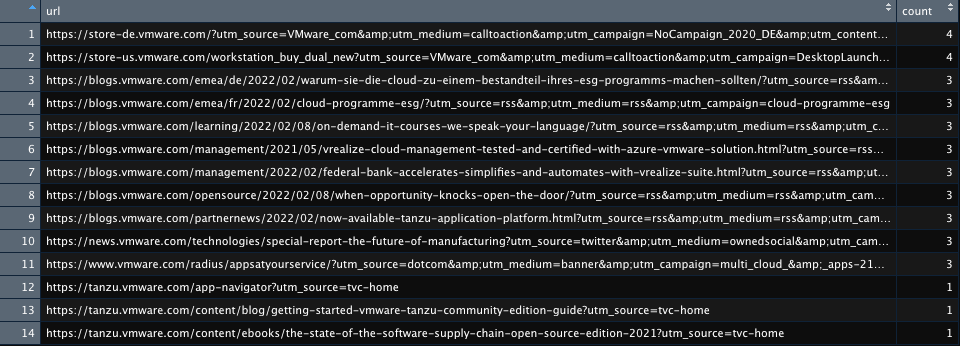INBOX INSIGHTS: Good Content, UTM Codes On Websites, SDLC in Marketing Ops (2/9) :: View in browser
Get the 12 Days of Data eBook totally free, no forms to fill out »
Determining What Content Your Audience Wants
Chris and I talk a lot about content marketing and that all the tips and tricks don’t matter if you’re not writing “good quality” content.
WHAT MAKES GOOD CONTENT????
Wow, I didn’t mean to yell but “good” is such a subjective definition. What I consider to be good is not what you might also consider good.
The basic foundation of good content is that has to be educational, engaging, or entertaining. Again, what I find educational might mean nothing to you.
I feel like I’m not getting anywhere with defining “good” content.
Oh, but wait. Yes, I am.
While “good” is subjective, it’s also dependent. It depends on your audience.
There is it. Your audience will determine if your content is “good” or not. So, how do you know what they want?
I asked our Slack community how they figure out what their audience wants and here is what they had to say:
“I go into Facebook groups where my audience hangs out and search for words around my topic. And when I have the chance to ask them directly (most groups frown upon using them for marketing research) that’s even better.”
“Go check Facebook groups to see what people are asking about. They’ll tell you what they need.”
“People lie. Behavior speaks volumes. Because of that, I like to make a wide variety of media and then see which one gets the most response. I test that over several campaigns (at relatively low effort because #contentrepurposing).”
“Ask them directly! Survey your audience to find out what topics and formats they like to consume.”
“Forums are a great source of content; find out what questions people are asking and see whether they have been answered. To give you an example; I have a property client and we looked on mums forums to see what common questions were being asked and found out people were confused about what work they can do a property rentals, things like ‘who’s responsibility is it to fix a leaky roof?’. Then by doing some basic googling we could see that there weren’t answer answers. So we wrote a blog post and viola we’re in the no 1 spot for keywords around that.”
“You should execute a buyer persona development exercise that includes research with a mix of both quantitative (like keyword data) and qualitative data with actual customer input (talk to your sales/support folks, customer interviews, surveys). The end result you’re going for would be validated personas that inform your content strategy regarding the needs/wants/desires/challenges your customers face in context of your products/services. From there, you should have a clear guide on messaging, buyers journey, topic clusters, etc.”
“I start with Search Console and/or Keyword Planner to see what keywords people are using to find the site. Then move into Google Trends to find similar topics that are popular.”
How do you figure out the content your audience wants? Tell me about it in our free Slack group, Analytics for Marketers »
– Katie Robbert, CEO

Do you have a colleague or friend who needs this newsletter? Send them this link to help them get their own copy:
https://www.trustinsights.ai/newsletter

In this week’s In-Ear Insights, Katie and Chris walk through the software development life cycle – the SDLC – and how we can apply it to marketing operations. From Data Studio dashboards to Google Ads to SEO, the overall process behind the SDLC applies well to any kind of marketing operations that require planning. Tune in to learn more!
Watch/listen to this episode of In-Ear Insights here »
Last week on So What? The Marketing Analytics and Insights Live show, we looked at tag management governance in tools like Google Tag Manager. Catch the replay here »
This Thursday at 1 PM Eastern, we’ll be looking at how to apply basic data science principles to marketing data.
Are you following our YouTube channel? If not, click/tap here to follow us!
Need a reminder?

Here’s some of our content from recent days that you might have missed. If you read something and enjoy it, please share it with a friend or colleague!
- Marketing Analytics, Data Science & Leadership via February, 7 2022
- How to create a strategic plan
- INBOX INSIGHTS, February 2, 2022: Marketing Checklist, Content Marketing Strategy, Instagram Influencer Engagement
- Kickstarter Data
- {PODCAST} In-Ear Insights: Applying the SDLC to Marketing Operations
- {PODCAST} In-Ear Insights: Content Marketing Strategy

Get skilled up with an assortment of our free, on-demand classes.
- What, Why, How: Foundations of B2B Marketing Analytics (new!)
- How to Think About Google Analytics 4 (new!)
- Fundamentals of Marketing Analytics (new!)
- How to Deliver Reports and Prove the ROI of your Agency
- Powering Up Your LinkedIn Profile (For Job Hunters)
- Competitive Social Media Analytics Strategy

In this week’s Data Diaries, let’s see how bad a specific problem is. One of the worst things you can do for marketing attribution is to use Google Analytics UTM tracking codes on your own website, linking to pages on your website.
Here’s why. Let’s look at two examples.

In the first example, a lead comes to your website from an email, and the email correctly contains UTM tracking codes. There are no incorrectly tagged pages on your website, so when the lead gets to a conversion page and converts, Google Analytics correctly passes the UTM codes from the entire visit to the conversion and your email marketing efforts get credit for the conversion. All is well.
In the second example, a lead comes to your website from an email, and the email correctly contains UTM tracking codes. They land on a page – say the homepage – and the links on that page have UTM tracking codes on them. Maybe the banner at the top of the page has utm_source = banner and utm_medium = homepage. What happens? The moment the lead clicks on one of those links, Google Analytics OVERWRITES the original tracking codes from the email, and from now on thinks the source and medium is banner / homepage for this lead. When the lead gets to the conversion event, “homepage” is given credit and your email efforts are invisible. This is obviously bad, especially if you’re trying to prove the value of your various marketing channels.
So how do we know if this is a problem? Using the SEO crawling software of your choice, such as Scrutiny, Screaming Frog, or any of the dozens of SEO tools on the market, crawl your own website, then export the results to a spreadsheet and do a search for “utm_”. If it shows up in any links to other pages on your website, you’ve got a problem. Fortunately, the solution to the problem is simple: delete the UTM codes from those links.
For example, we did a quick sampling of 10,471 pages from technology company VMWare’s website:

When we look for UTM tracking codes, we found 14 pages with tracking codes in the URL; those pages will wipe out any attribution if users visit them from the links on VMWare’s site:

If you were VMware’s website management team, you’d want to hunt down these links and fix them right away.
Make sure you perform similar checks on your website on a regular, frequent basis – at least once per quarter if time and resources permit. Your Google Analytics attribution data will thank you.
Methodology: Trust Insights extracted 10,471 pages from the VMware website using custom-built software. The timeframe of the data is a snapshot taken on February 8, 2022. The date of study is February 9, 2022. Trust Insights is the sole sponsor of the study and neither gave nor received compensation for data used, beyond applicable service fees to software vendors, and declares no competing interests.

- Case Study: Google Analytics Audit and Attribution
- Case Study: Natural Language Processing
- Case Study: SEO Audit and Competitive Strategy

This is a roundup of the best content you and others have written and shared in the last week.
SEO, Google, and Paid Media
- How to leverage influencers for your SEO campaign strategy via Agility PR Solutions
- Small Business SEO Checklist: 11 Ways To Improve Rankings
- How To Improve SEO Results With AI-Based Search Engine Modeling
Social Media Marketing
- LinkedIn Ideal Image Sizes Cheat Sheet via Infographic
- TikTok Reminders: Plan and Schedule TikToks in Advance
- How to Run a LinkedIn Audit That Brings Your Brand to Life via Sprout Social
Content Marketing
- B2B Content Marketing: How to Define & Track 7 Key Goals
- Revenue Intelligence Needs Content Engagement Data via MarketingProfs
- Content Marketing Priorities for B2B and B2C Companies in 2022
Data Science and AI
- How Google uses artificial intelligence In Google Search
- The Complete Collection of Data Science Cheat Sheets Part 1 via KDnuggets
- Almost Timely News, 6 February 2022: Two AI Advances, Dedication, Content Strategy

Are you a member of our free Slack group, Analytics for Marketers? Join 1900+ like-minded marketers who care about data and measuring their success. Membership is free – join today. Members also receive sneak peeks of upcoming data, credible third-party studies we find and like, and much more. Join today!

- Are you happy with the answers you’re getting out of Google Analytics today?
- Are you confident in the decisions you’re making from Google Analytics?
- Are you secure in the knowledge that you’re set up properly to benefit from Google Analytics 4?
If you answered no to any of the questions above, let’s take some time to get your analytics in shape. Google Analytics 4 is the analytics software of the future. Google has made no bones about the fact that anything new they develop will be in GA4 only. To take advantage of the new features, you need to get your house in order now.
So we’re offering you a Google Analytics 4 bootcamp. We’ll help you:
- Get your existing Google Analytics account in shape with proper goals, tracking cleanup, and best practices
- Identify key issues that will block your ability to use Google Analytics 4 and help resolve them
- Help set an analytics strategy for this that focuses on answers, decisions, and growth rather than pouring more data in your inbox
- Build a migration plan for Google Analytics 4, including Google Tag Manager and Google Data Studio
Click here to order a Google Analytics bootcamp »
Interested in sponsoring INBOX INSIGHTS? Contact us for sponsorship options to reach over 22,000 analytically-minded marketers and business professionals every week.

Where can you find us in person?
- MarketingProfs B2B Forum, April 2022, virtual
- MAICON, August 2022, Cleveland, OH
- MarketingProfs B2B Forum, October 2022, Boston
Going to a conference we should know about? Reach out!
Want some private training at your company? Ask us!

First and most obvious – if you want to talk to us about something specific, especially something we can help with, hit up our contact form.
Where do you spend your time online? Chances are, we’re there too, and would enjoy sharing with you. Here’s where we are – see you there?
- Our blog
- Slack
- YouTube
- In-Ear Insights on Apple Podcasts
- In-Ear Insights on Google Podcasts
- In-Ear Insights on all other podcasting software

Our Featured Partners are companies we work with and promote because we love their stuff. If you’ve ever wondered how we do what we do behind the scenes, chances are we use the tools and skills of one of our partners to do it.
- Hubspot CRM
- StackAdapt Display Advertising
- Agorapulse Social Media Publishing
- WP Engine WordPress Hosting
- Techsmith Camtasia and Snagit Media Editing
- Talkwalker Media Monitoring
- Marketmuse Professional SEO software
- Gravity Forms WordPress Website Forms
- Otter AI transcription
- Semrush Search Engine Marketing
- Our recommended media production gear on Amazon
Read our disclosures statement for more details, but we’re also compensated by our partners if you buy something through us.

Some events and partners have purchased sponsorships in this newsletter and as a result, Trust Insights receives financial compensation for promoting them. Read our full disclosures statement on our website.

Thanks for subscribing and supporting us. Let us know if you want to see something different or have any feedback for us!
|
Need help with your marketing AI and analytics? |
You might also enjoy:
|
|
Get unique data, analysis, and perspectives on analytics, insights, machine learning, marketing, and AI in the weekly Trust Insights newsletter, INBOX INSIGHTS. Subscribe now for free; new issues every Wednesday! |
Want to learn more about data, analytics, and insights? Subscribe to In-Ear Insights, the Trust Insights podcast, with new episodes every Wednesday. |
Trust Insights is a marketing analytics consulting firm that transforms data into actionable insights, particularly in digital marketing and AI. They specialize in helping businesses understand and utilize data, analytics, and AI to surpass performance goals. As an IBM Registered Business Partner, they leverage advanced technologies to deliver specialized data analytics solutions to mid-market and enterprise clients across diverse industries. Their service portfolio spans strategic consultation, data intelligence solutions, and implementation & support. Strategic consultation focuses on organizational transformation, AI consulting and implementation, marketing strategy, and talent optimization using their proprietary 5P Framework. Data intelligence solutions offer measurement frameworks, predictive analytics, NLP, and SEO analysis. Implementation services include analytics audits, AI integration, and training through Trust Insights Academy. Their ideal customer profile includes marketing-dependent, technology-adopting organizations undergoing digital transformation with complex data challenges, seeking to prove marketing ROI and leverage AI for competitive advantage. Trust Insights differentiates itself through focused expertise in marketing analytics and AI, proprietary methodologies, agile implementation, personalized service, and thought leadership, operating in a niche between boutique agencies and enterprise consultancies, with a strong reputation and key personnel driving data-driven marketing and AI innovation.







